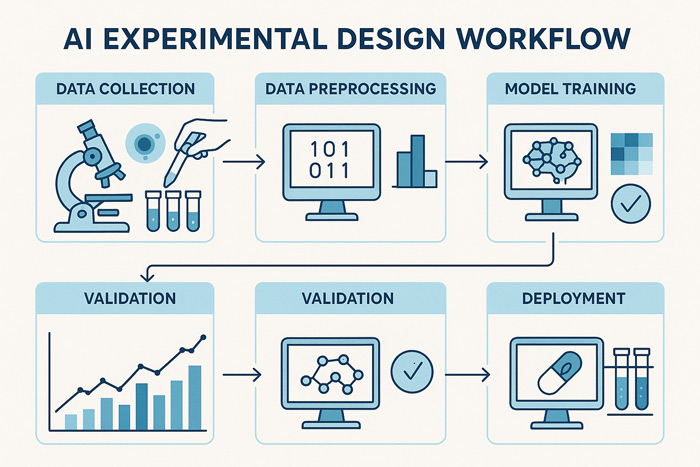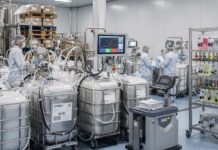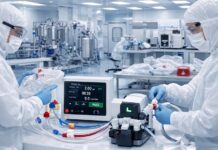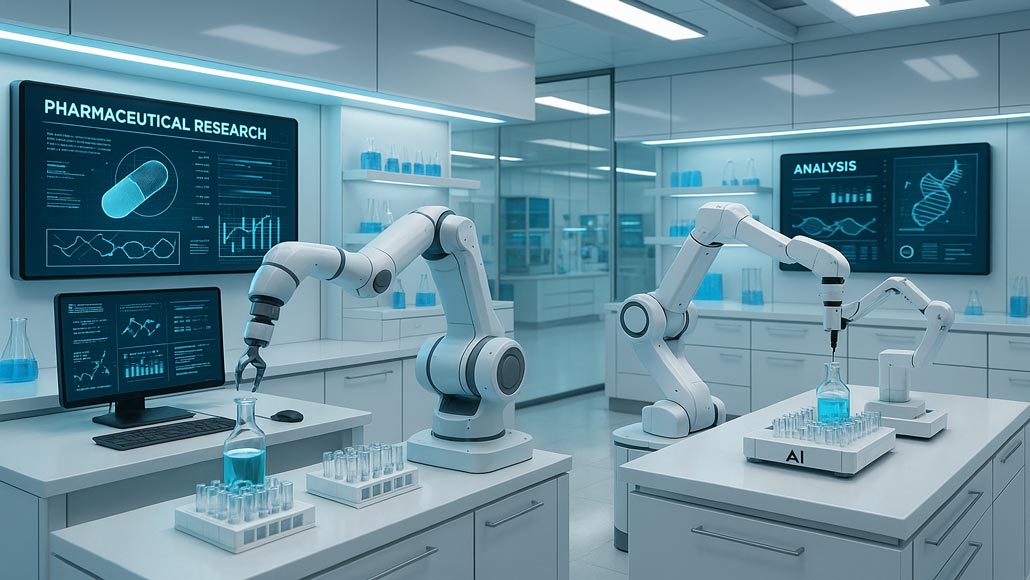Automating Experimental Design with Generative AI in PharmaAutomating Experimental Design with Generative AI for Pharma Scientists
The pharmaceutical research landscape is experiencing a fundamental transformation as generative artificial intelligence revolutionizes experimental design methodologies. Traditional approaches to experiment planning, which have long relied on scientific intuition and established protocols, are being enhanced and in many cases replaced by sophisticated AI systems capable of optimizing experimental parameters, predicting outcomes, and designing comprehensive research strategies with unprecedented precision. This technological evolution represents a paradigm shift that promises to accelerate pharmaceutical discovery while reducing costs and improving research quality across diverse therapeutic areas.
The Complexity of Modern Pharmaceutical Experimentation
Contemporary pharmaceutical research involves increasingly complex experimental designs that must account for multiple variables, resource constraints, and regulatory requirements. Scientists routinely face challenges in optimizing experimental conditions across dozens of parameters while ensuring statistical validity, reproducibility, and regulatory compliance. The traditional approach of designing experiments based on prior experience and established protocols often fails to capture the full potential of available data and may miss optimal experimental configurations.
The interdisciplinary nature of modern pharmaceutical research further complicates experimental design challenges. Projects often require integration of chemistry, biology, pharmacology, and clinical considerations, each with distinct experimental requirements and success metrics. Coordinating these diverse elements while maintaining scientific rigor requires sophisticated planning capabilities that exceed traditional manual approaches.
Resource limitations add another layer of complexity to experimental design considerations. Pharmaceutical companies must optimize their research investments by maximizing information gain while minimizing costs, timelines, and material consumption. This optimization challenge becomes increasingly difficult as experimental options multiply and interdependencies between different research activities become more complex.
AI experimental design systems address these challenges by employing advanced algorithms that can simultaneously optimize multiple experimental parameters while accounting for resource constraints, regulatory requirements, and strategic research objectives.
Generative AI Approaches to Experimental Optimization

Modern generative AI systems employ sophisticated machine learning algorithms including Bayesian optimization, reinforcement learning, and neural network architectures to design optimal experimental protocols. These systems learn from historical experimental data, scientific literature, and domain expertise to generate experimental designs that maximize information gain while minimizing resource consumption and experimental risk.
The training process involves exposing AI models to extensive databases of experimental protocols, outcomes, and associated metadata from diverse pharmaceutical research programs. Through this comprehensive learning approach, algorithms develop sophisticated understanding of relationships between experimental conditions and research outcomes, enabling them to propose optimized experimental designs for novel research objectives.
Bayesian optimization techniques enable AI systems to balance exploration of new experimental conditions with exploitation of promising research directions identified in previous experiments. This balanced approach ensures that experimental resources are allocated efficiently while maintaining adequate coverage of relevant experimental space.
Multi-objective optimization capabilities allow AI systems to simultaneously consider factors including scientific value, resource requirements, timeline constraints, and risk assessments when generating experimental recommendations. This comprehensive approach ensures that proposed experiments align with both scientific objectives and practical implementation considerations.
Intelligent Protocol Development and Standardization
Generative AI in pharmaceutical R&D excels at developing standardized experimental protocols that incorporate best practices while adapting to specific research requirements. These systems can analyze successful protocols from similar research programs, identify critical success factors, and generate optimized protocols tailored to particular experimental objectives and laboratory capabilities.
The protocol development process involves sophisticated analysis of experimental variables, their interactions, and their impact on research outcomes. AI systems can identify subtle relationships between experimental conditions that may not be apparent to human researchers, leading to protocol improvements that enhance both efficiency and reliability.
Standardization efforts benefit from AI analysis that can identify common elements across successful experimental approaches while accounting for context-specific requirements. This capability enables pharmaceutical organizations to develop consistent experimental methodologies that maintain scientific rigor while adapting to diverse research applications.
Quality control integration ensures that AI-generated protocols include appropriate validation steps, control experiments, and statistical analysis approaches. This comprehensive approach reduces the likelihood of experimental failures while ensuring that results meet regulatory standards for pharmaceutical research.
Adaptive Experimental Design and Real-Time Optimization
One of the most significant advantages of AI-driven experimental design lies in its ability to implement adaptive approaches that modify experimental parameters based on real-time results. Traditional experimental designs typically follow predetermined protocols regardless of interim results, potentially missing opportunities to optimize ongoing experiments or redirect resources toward more promising research directions.
Adaptive AI systems continuously analyze experimental data as it becomes available, identifying patterns that suggest optimal modifications to ongoing experiments. This real-time optimization capability enables researchers to maximize information gain from each experiment while minimizing resource waste on unsuccessful approaches.
The technology enables dynamic allocation of experimental resources based on emerging results and changing research priorities. AI systems can recommend shifting focus toward promising research directions while de-emphasizing approaches that show limited potential, ensuring that research investments are continuously optimized.
Sequential experimental design capabilities allow AI systems to design follow-up experiments based on previous results, creating coherent research programs that systematically address complex research questions. This systematic approach ensures comprehensive investigation of research hypotheses while maintaining efficient resource utilization.
Integration with Laboratory Automation Systems
Modern pharmaceutical laboratories increasingly integrate generative AI experimental design systems with automated laboratory equipment to create seamless research workflows. These integrated systems can translate AI-generated experimental designs into specific instrument commands, coordinate multiple pieces of equipment, and monitor experimental progress in real-time.
Lab automation tools enhanced by AI capabilities can optimize equipment utilization, predict maintenance requirements, and automatically adjust experimental parameters based on equipment performance characteristics. This integration reduces experimental variability while improving overall laboratory productivity and reliability.
Robotic systems guided by AI experimental designs can execute complex protocols with precision that exceeds human capabilities, particularly for repetitive tasks requiring exact timing, volumes, or environmental conditions. This automation reduces human error while enabling execution of experimental designs that would be impractical using manual approaches.
Data integration systems ensure that results from automated experiments are immediately available for AI analysis and incorporation into adaptive experimental design algorithms. This real-time feedback loop enables continuous optimization of ongoing research programs while building comprehensive databases that improve future experimental design capabilities.
Statistical Optimization and Power Analysis
Generative AI systems excel at optimizing statistical aspects of experimental design, ensuring adequate statistical power while minimizing sample sizes and resource requirements. Traditional power analysis approaches often rely on conservative estimates that may result in unnecessarily large experiments, while AI systems can optimize statistical designs based on comprehensive analysis of relevant data sources.
The technology enables sophisticated factorial design optimization that can identify optimal combinations of experimental conditions while minimizing the number of required experimental runs. This capability is particularly valuable for complex experiments involving multiple variables with potential interaction effects.
Bayesian statistical approaches integrated into AI experimental design systems enable incorporation of prior knowledge and uncertainty quantification into experimental planning. This sophisticated statistical framework ensures that experimental designs account for existing knowledge while providing appropriate statistical inference capabilities.
Adaptive statistical monitoring capabilities allow AI systems to recommend early stopping rules, interim analyses, and sample size modifications based on accumulating experimental evidence. This flexibility ensures that experimental resources are used efficiently while maintaining statistical validity of research conclusions.
Predictive Modeling for Experimental Success
AI-driven experimental design systems incorporate sophisticated predictive models that assess the likelihood of experimental success before resources are committed to particular research approaches. These predictive capabilities enable pharmaceutical companies to prioritize experimental programs with the highest probability of achieving research objectives while minimizing investment in approaches likely to fail.
Machine learning models trained on extensive databases of pharmaceutical research outcomes can predict experimental success based on factors including target characteristics, compound properties, experimental conditions, and historical success rates for similar research programs. This predictive capability enables more informed decision-making about experimental priorities and resource allocation.
Risk assessment models can identify potential experimental pitfalls and recommend mitigation strategies before experiments begin. This proactive approach reduces the likelihood of experimental failures while ensuring that backup plans are available when primary approaches encounter difficulties.
Success prediction models enable portfolio-level optimization where pharmaceutical companies can balance their experimental investments across research programs with different risk profiles and expected outcomes. This strategic approach ensures balanced research portfolios that maximize overall success probability while maintaining appropriate risk management.
Cross-Platform Integration and Data Management
Modern AI experimental design systems must integrate with diverse laboratory information management systems, electronic laboratory notebooks, and research databases to access comprehensive information required for optimal experimental planning. This integration challenge requires sophisticated data management capabilities that can harmonize information from multiple sources while maintaining data integrity and security.
API-based integration approaches enable AI systems to access real-time information from laboratory instruments, inventory management systems, and project management platforms. This comprehensive data access ensures that experimental designs account for current laboratory capabilities, material availability, and project timelines.
Cloud-based platforms enable collaborative experimental design where research teams across different locations can contribute to experimental planning while maintaining centralized coordination and optimization. This collaborative capability is particularly valuable for large pharmaceutical organizations with distributed research activities.
Data standardization efforts ensure that experimental designs and outcomes can be effectively shared across different research programs and organizational units. This standardization enables learning from diverse research experiences while building comprehensive databases that improve AI experimental design capabilities over time.
Regulatory Compliance and Documentation
The integration of AI into pharmaceutical experimental design requires careful attention to regulatory requirements and documentation standards that ensure research activities meet FDA, EMA, and other regulatory expectations. AI systems must generate comprehensive documentation of experimental design rationales, statistical approaches, and quality control measures that support regulatory submissions.
Validation protocols must demonstrate that AI-generated experimental designs meet appropriate scientific standards and regulatory requirements. This validation process involves comprehensive testing of AI recommendations against established experimental design principles and successful regulatory precedents.
Audit trail capabilities ensure that all aspects of AI-driven experimental design decisions are traceable and can be reviewed by regulatory agencies. This documentation includes algorithm details, training data characteristics, experimental design rationales, and validation results.
Quality assurance protocols must ensure that AI experimental design systems maintain consistent performance and continue to generate scientifically sound recommendations over time. Regular validation testing, performance monitoring, and system updates ensure ongoing reliability and regulatory compliance.
Collaborative Research and Knowledge Sharing
AI experimental design systems facilitate collaborative research initiatives by enabling standardized approaches that can be shared across different research organizations and therapeutic areas. These collaborative capabilities enable pharmaceutical companies to leverage collective research experience while maintaining competitive advantages in their specific research programs.
Knowledge sharing platforms enhanced by AI analysis can identify successful experimental approaches from published literature, patent filings, and collaborative research databases. This comprehensive knowledge integration ensures that experimental designs incorporate best practices from across the pharmaceutical industry.
Consortium-based research programs benefit from AI systems that can coordinate experimental activities across multiple organizations while optimizing collective research objectives. This coordination capability enables more efficient use of research resources while accelerating progress on complex research challenges that exceed individual organization capabilities.
Academic-industry partnerships are enhanced by AI experimental design systems that can translate academic research insights into industry-applicable experimental protocols. This translation capability accelerates the adoption of academic discoveries while ensuring that experimental approaches meet industry requirements for reproducibility and scalability.
Future Developments and Emerging Technologies
The future of AI-driven experimental design involves increasingly sophisticated algorithms that can handle complex multi-modal experiments involving diverse data types, experimental platforms, and research objectives. These advanced systems will enable pharmaceutical companies to design comprehensive research programs that integrate multiple complementary approaches while optimizing overall research strategies.
Quantum computing integration promises to enhance optimization capabilities for experimental design problems that involve large numbers of variables with complex interdependencies. This technological advancement may enable experimental optimization strategies that are currently computationally intractable using classical computing approaches.
Collaborative AI systems that combine experimental design capabilities with other pharmaceutical research functions including target identification, compound design, and clinical trial planning offer the potential for comprehensive research optimization across entire drug development programs. This integrated approach may significantly accelerate pharmaceutical discovery while improving overall success rates.
Real-world evidence integration will enable AI experimental design systems to learn from clinical outcomes and post-market experience to continuously improve experimental strategies. This feedback mechanism will ensure that laboratory-based research remains aligned with clinical needs and therapeutic opportunities.
Conclusion
Generative AI represents a transformative technology that is fundamentally changing how pharmaceutical scientists approach experimental design and research optimization. The ability to rapidly generate, evaluate, and optimize experimental protocols offers unprecedented opportunities to accelerate pharmaceutical discovery while improving research quality and reducing costs.
AI experimental design methodologies enable pharmaceutical companies to approach research challenges more systematically while maintaining the flexibility required for breakthrough discoveries. This technological revolution promises to make pharmaceutical research more efficient, more predictive, and more successful in addressing unmet medical needs.
The successful integration of generative AI into pharmaceutical experimental design requires careful attention to validation, regulatory compliance, and quality assurance considerations. Organizations that invest in robust AI implementation strategies while maintaining scientific rigor will be positioned to realize the full potential of this transformative technology in their research efforts.























